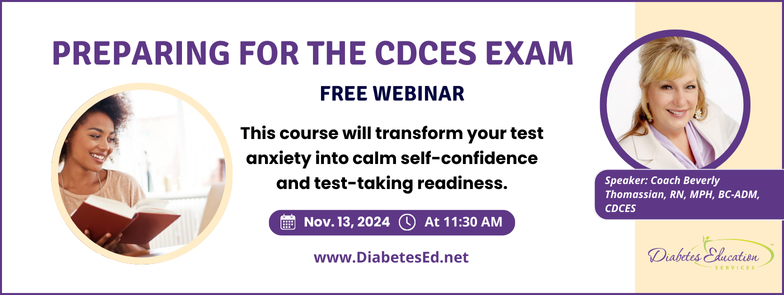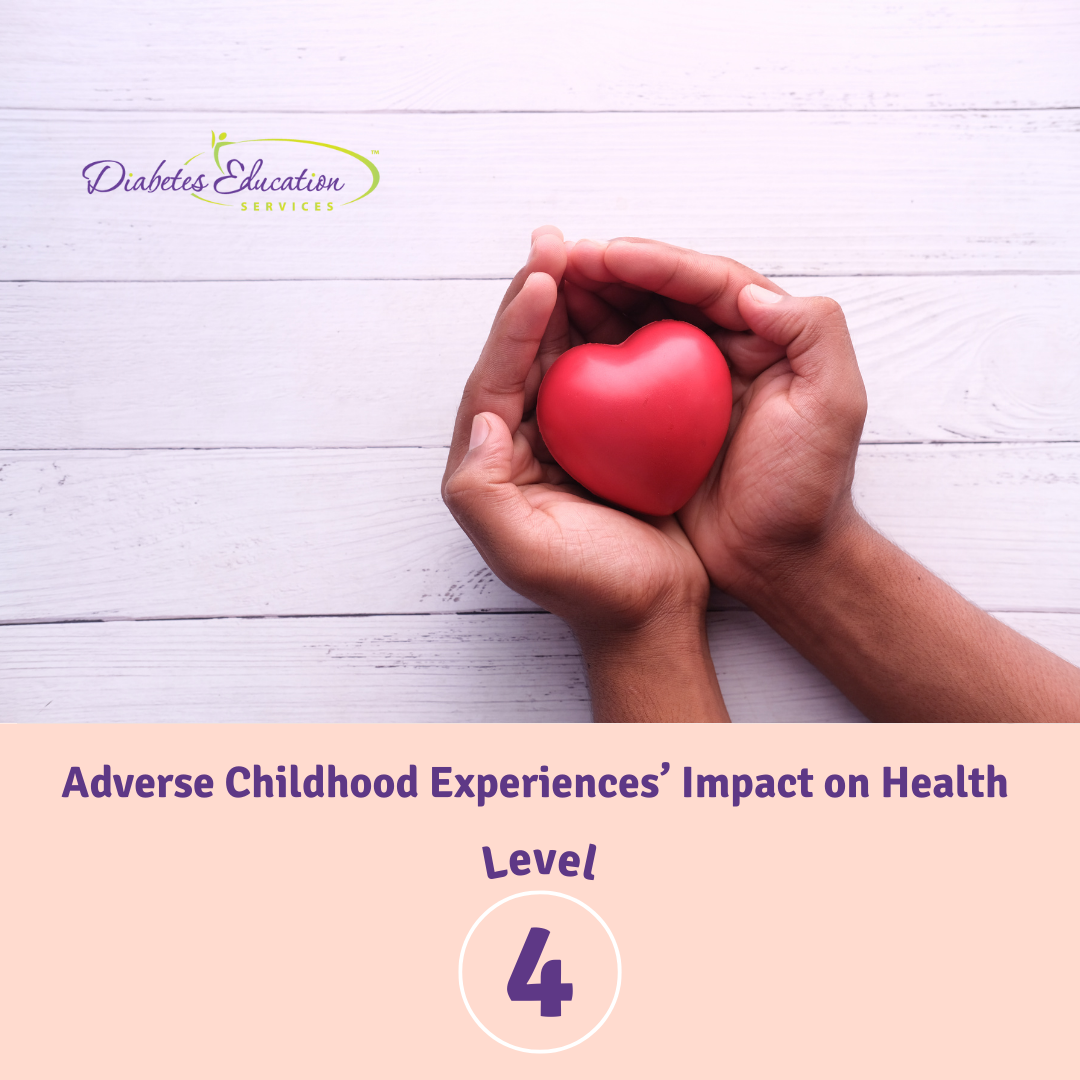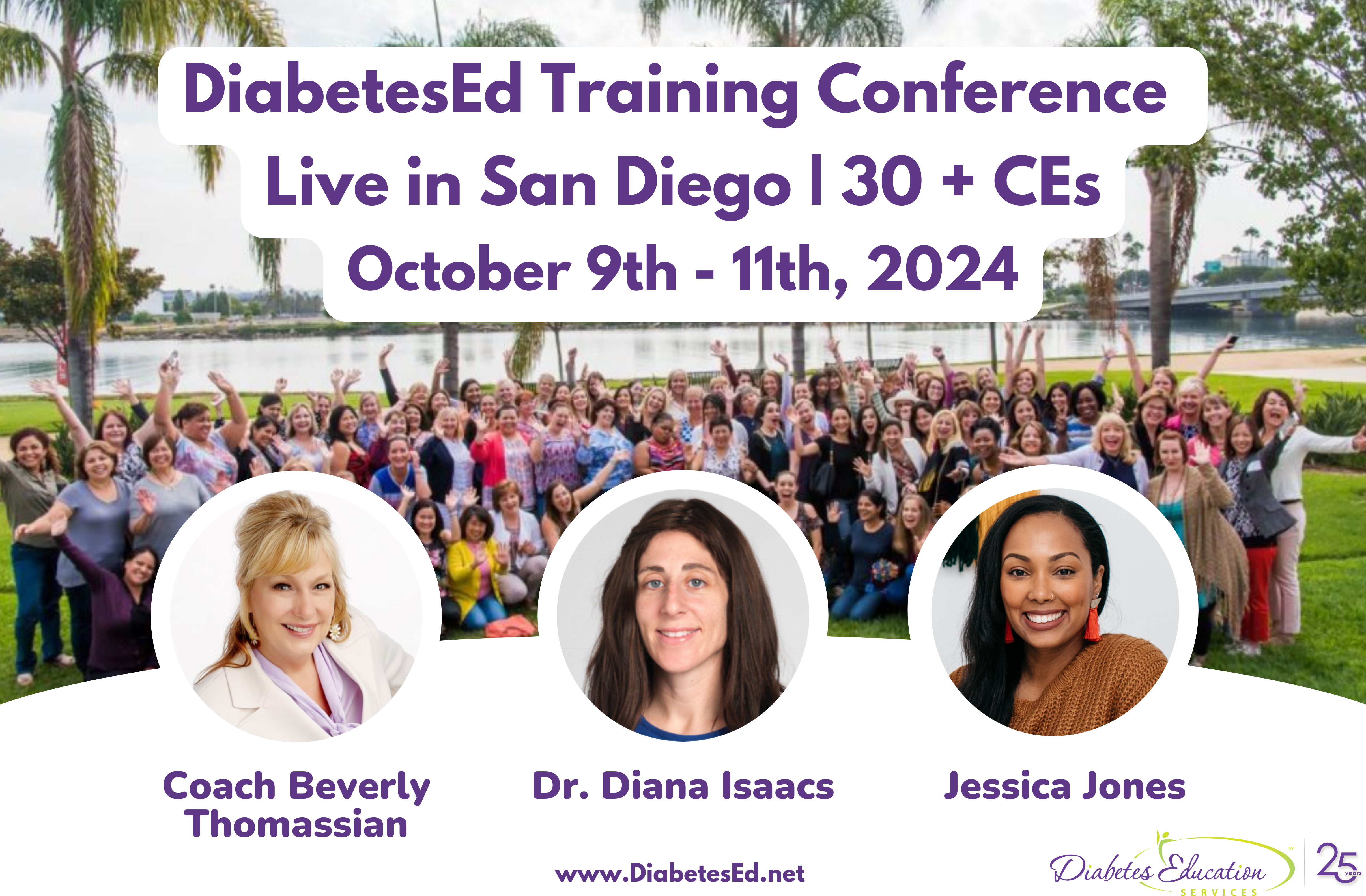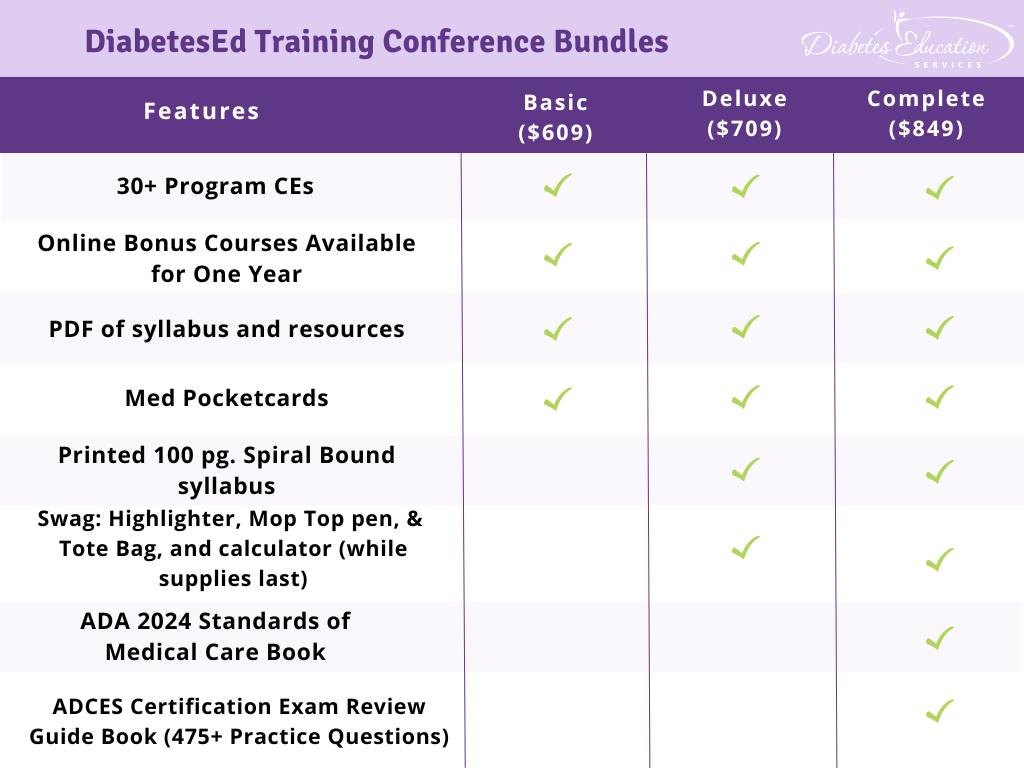
Ready to get certified?
Free CDCES Coach App

Subscribe
eNewsletter
Download
Free Med Pocket Cards
Question of the Week | Which Approach Considers Cultural Humility

You are caring for ML, a Latinx person with newly diagnosed diabetes about lifestyle modifications. ML mentions that traditional family dinners are a central part of their daily routine.
How can the educator apply cultural humility in their approach to diabetes education to support ML’s dietary needs and preferences?
- Advise the ML to avoid traditional foods that are higher in carbohydrates.
- Ask ML about the traditional types of foods they typically eat and enjoy.
- Provide a standardized meal plan considering cultural food preferences.
- Emphasize the importance of monitoring carb intake regardless of cultural traditions.
Want to learn more about this question?
Join us live on November 13, 11:30 am PST for our
FREE Prep for CDCES Exam Webinar

Join us to get ready to succeed a the CDCES Exam. This course will transform your test anxiety into calm self-confidence and test taking readiness. Topics covered include:
- Changes in requirements for 2024
- Exam eligibility and the updated test format
- Strategies to succeed
- Review of study tips and test taking tactics.
We will review sample test questions, and the reasoning behind choosing the right answers.
After registering, you will receive a confirmation email containing information about joining the webinar.
Intended Audience: This FREE webinar is designed for individual or groups of diabetes educators, including RNs, RDs, Pharmacists, Nurse Practitioners, Clinical Nurse Specialists, Physician Assistants and other health care providers interested in achieving excellence in diabetes care and becoming Certified Diabetes Care and Education Specialists®.
Instructor: Beverly Thomassian RN, MPH, CDCES, BC-ADM is a working educator who has passed her CDCES Exam 7 times. She is a nationally recognized diabetes expert for over 25 years.
Sign up for Diabetes Blog Bytes – we post weekly Blog Bytes that are informative and FREE! Every week we post one exam practice Question of the Week and Rationale of the Week. Sign up below!
Recent Blog Bytes
- Rationale of the Week | What Does J.C.’s Family History & Lab Work Reveal?
- Red Flags for Low Digital Literacy in Diabetes Care
- Question of the Week | Best Response for Facilitating Positive Health Behavior Change?
- Rationale of the Week | What to Assess When Looking for PAD?
- Grief and the Role of the Diabetes Educator
The use of DES products does not guarantee the successful passage of the certification exam. CBDCE and ADCES do not endorse any preparatory or review materials for the CDCES or BC-ADM exams, except for those published by CBDCE & ADCES.
Question of the Week | Type 1 and Food Insecurity

AR is an 8 year old with type 1 diabetes who has a CGM but still uses insulin injections due to lack of insurance coverage. AR’s parents struggle with food insecurity and some days AR only has school provided breakfast and lunch. You notice he is experiencing level 1 hypoglycemia frequently around 6pm.
What is the best first intervention?
- Reassess the insulin dosing strategy.
- Double check that the family has a glucagon emergency kit.
- Reduce insulin dose and start a SGLT-2i to prevent hypoglycemia.
- Make sure AR is wearing identification that says they have type 1 diabetes.
Want to learn more about this question?
Join us live on October 29th 2024 11:30 am PST for our
The Impact of Adverse Childhood Experiences on Health
Level 4 Advanced Specialty Topics

Adverse childhood experiences (ACE) are associated with an increased risk of diabetes, heart disease, cancer & a variety of other health consequences for adults. This session reviews how diabetes care & education specialists can provide screening, assessment, & trauma-informed care to individuals who experienced ACEs & are living with toxic stress. We will explore strategies to address ACES & improve outcomes for individuals & communities. Throughout, we will focus on supporting self-care with a focus on recognizing & promoting resilience.
Topics include:
- Discuss the benefits of assessing Adverse Childhood Experiences (ACE) in individuals with diabetes.
- State the relationship between ACE Scores & the risk of future health complications.
- Describe a person-centered approach to fostering resilience & self-care for individuals with toxic stress.
- Identify two strategies to provide trauma-informed care in your work setting.
Intended Audience: These courses are knowledge-based activities designed for individual or groups of diabetes educators, including RNs, RDs, Pharmacists, Nurse Practitioners, Clinical Nurse Specialists, Physician Assistants and other health care providers interested in enhancing their knowledge of management of inpatient hyperglycemia.
Instructor: Beverly Thomassian RN, MPH, CDCES, BC-ADM is a working educator and a nationally recognized diabetes expert.
Two registration options:
- Enroll for FREE (No CEs): Click here to enroll.
- Earn 0.5 CEs – Fee: $19.00 – Click here to enroll in the course.
Enroll in our entire Level 4 | Advanced & Specialty Topic Courses
Sign up for Diabetes Blog Bytes – we post weekly Blog Bytes that are informative and FREE! Every week we post one exam practice Question of the Week and Rationale of the Week. Sign up below!
Recent Blog Bytes
- Rationale of the Week | What Does J.C.’s Family History & Lab Work Reveal?
- Red Flags for Low Digital Literacy in Diabetes Care
- Question of the Week | Best Response for Facilitating Positive Health Behavior Change?
- Rationale of the Week | What to Assess When Looking for PAD?
- Grief and the Role of the Diabetes Educator
Accreditation: Diabetes Education Services is an approved provider by the California Board of Registered Nursing, Provider 12640, and our Level 4 | The Impact of Adverse Childhood Experiences on Health awards 1.0 CPEUs in accordance with the Commission on Dietetic Registration’s CPEU Prior Approval Program.
The use of DES products does not guarantee the successful passage of the certification exam. CBDCE and ADCES do not endorse any preparatory or review materials for the CDCES or BC-ADM exams, except for those published by CBDCE & ADCES.
Question of the Week | Jr arrives late and out of sorts.

JR is a 22-year-old living with type 1 diabetes who arrives late for their appointment and seems out of sorts. When looking at the ambulatory glucose profile, you notice that time in range is less than 40% and coefficient of variation is also over 40%. You remember from a previous visit that JR had experienced almost half a dozen adverse childhood experiences and had elevated diabetes distress.
Based on this information, what is the next best step?
- Use the empowerment approach to help JR take charge of their life.
- Request that JR is referred to a mental health specialist.
- Utilize motivational interviewing techniques to help JR through this rough spot.
- Create a judgement free zone and explore with JR how they are feeling.
Want to learn more about this question?
Join us live on October 29, 2024 for our
The Impact of Adverse Childhood Experiences on Health
Level 4 | Advanced & Specialty Topic Courses

Adverse childhood experiences (ACE) are associated with an increased risk of diabetes, heart disease, cancer & a variety of other health consequences for adults. This session reviews how diabetes care & education specialists can provide screening, assessment, & trauma-informed care to individuals who experienced ACEs & are living with toxic stress. We will explore strategies to address ACES & improve outcomes for individuals & communities. Throughout, we will focus on supporting self-care with a focus on recognizing & promoting resilience.
Objectives:
- Discuss the benefits of assessing Adverse Childhood Experiences (ACE) in individuals with diabetes.
- State the relationship between ACE Scores & the risk of future health complications.
- Describe a person-centered approach to fostering resilience & self-care for individuals with toxic stress.
- Identify two strategies to provide trauma-informed care in your work setting.
Learning Outcome:
Participants will identify how trauma can impact diabetes and self-management along with strategies to support hope when working with people with diabetes.
Target Audience:
This course is a knowledge-based activity designed for individuals or groups of diabetes professionals, including RNs, RDs/RDNs, Pharmacists, Nurse Practitioners, Clinical Nurse Specialists, Physician Assistants, and other healthcare providers interested in staying up to date on current practices of care for people with prediabetes, diabetes, and other related conditions. The practice areas for RDs/RDNs for CDR reporting are healthcare, preventative care, wellness, and, lifestyle along with, education and research.
CDR Performance Indicators:
- 9.2.1
- 9.2.3
- 9.4.3
Instructor: Beverly Thomassian RN, MPH, CDCES, has been Board Certified in Advanced Diabetes Management for over 15 years. She is an Associate Clinical Professor at UCSF, a working educator, and a nationally recognized diabetes expert.
Sign up for Diabetes Blog Bytes – we post weekly Blog Bytes that are informative and FREE! Every week we post one exam practice Question of the Week and Rationale of the Week. Sign up below!
Recent Blog Bytes
- Rationale of the Week | What Does J.C.’s Family History & Lab Work Reveal?
- Red Flags for Low Digital Literacy in Diabetes Care
- Question of the Week | Best Response for Facilitating Positive Health Behavior Change?
- Rationale of the Week | What to Assess When Looking for PAD?
- Grief and the Role of the Diabetes Educator
Accreditation: Diabetes Education Services is an approved provider by the California Board of Registered Nursing, Provider 12640, and our Level 4 | The Impact of Adverse Childhood Experiences on Health awards 1.0 CPEUs in accordance with the Commission on Dietetic Registration’s CPEU Prior Approval Program.
The use of DES products does not guarantee the successful passage of the certification exam. CBDCE and ADCES do not endorse any preparatory or review materials for the CDCES or BC-ADM exams, except for those published by CBDCE & ADCES.
Question of the Week | JR and Donut Fridays – What is the wise approach?

You are reviewing JR’s ambulatory glucose profile and it is over 70% time in range. JR usually takes bolus insulin before each meal and basal insulin at night. However, you notice that once a week on Fridays, JR’s blood glucose levels are above target between 2-5pm. When you bring this Friday glucose elevation to JR’s attention, they tell you it’s because the boss always brings in donuts after lunch on Fridays to celebrate everyone’s hard work. JR asks you about strategies to address this time above target.
What is the wise approach?
- Have you considered eating a piece of fruit instead?
- Can you let your boss know that you appreciate the gesture, but your diabetes doesn’t allow for this treat.
- Would you consider giving a little extra bolus insulin and enjoying the donut?
- Would you be willing to bring in a special low carb treat for everyone to enjoy?
Want to learn more about this question?
Invite Coach Beverly Thomassian to Speak – In Person or Virtually!
An Innovative Approach to Diabetes Education
With over two decades as a thought leader in diabetes care and education, Beverly is an inspiring and informational presenter. She can delve deep into the science of diabetes while incorporating real-life applications coupled with a compassionate approach that resonates with healthcare professionals.
Beverly is a relentless advocate for non-judgmental and inclusive diabetes care and believes that we are at our best when we are curious, kind, and engaging.
As a nurse entrepreneur and professional speaker, Beverly champions person-centered and evidence-based diabetes care through her live courses, keynote speeches, and webinar presentations.
Coach Beverly makes it a priority to make time to teach at conferences and organizations across the country. In addition to providing the latest research-based information, she incorporates story telling, games, movement breaks and small group activities.
She believes people learn best when the content is meaningful and fun!
Participants leave feeling energized, inspired, and excited about providing best diabetes care.
See more info here >>
Sign up for Diabetes Blog Bytes – we post weekly Blog Bytes that are informative and FREE! Every week we post one exam practice Question of the Week and Rationale of the Week. Sign up below!
Recent Blog Bytes
- Rationale of the Week | What Does J.C.’s Family History & Lab Work Reveal?
- Red Flags for Low Digital Literacy in Diabetes Care
- Question of the Week | Best Response for Facilitating Positive Health Behavior Change?
- Rationale of the Week | What to Assess When Looking for PAD?
- Grief and the Role of the Diabetes Educator
The use of DES products does not guarantee the successful passage of the diabetes certification exams. CBDCE & ADCES does not endorse any preparatory or review materials for the certification exams, except for those published by CBDCE & ADCES.
**To satisfy the requirement for renewal of certification by continuing education for the Certification Board for Diabetes Care & Education (CBDCE), continuing education activities must be applicable to diabetes and approved by a provider on the CBDCE List of Recognized Providers (www.ncbde.org). CBDCE does not approve of continuing education. Diabetes Education Services is accredited/approved by the Commission of Dietetic Registration which is on the list of CBDCE Recognized Providers.
Question of the Week | Screening for Celiac Disease

TC is a 15-year-old who was diagnosed with type 1 diabetes just over a year ago. Following their diagnosis, they quickly transitioned to sensor-augmented pump therapy and are not currently taking any other medications. Recent lab results show that lipid and renal profiles are on target, A1C of 7.5%, and a fasting glucose level of 148 mg/dL. Despite following a nutrient-rich diet, TC reports experiencing fatigue, difficulty gaining weight, frequent nausea, and diarrhea.
What Standard of Care recommendation may help explain TC’s reported symptoms?
- TC’s Hemoglobin A1c is above target. Elevated glucose values could be contributing to fatigue and difficulty with weight gain.
- Ensure IgA tissue transglutaminase (tTG) antibodies, with documentation of total serum IgA levels, have been measured and noted.
- Recommend a gluten-free diet since individuals with type 1 diabetes can be at higher risk of celiac disease.
- Consider referral for a gastric emptying study given complaint of frequent nausea and diarrhea.
Want to learn more about this question?
Join us Live in Beautiful San Diego for our
Annual DiabetesEd Training Conference
October 9th-11th, 2024

Join Coach Beverly and Team for two and a half days of knowledge-sharing, fun, networking, games with prizes, and “aha” moments in beautiful San Diego on October 9-11, 2024.
You don’t want to miss this one-of-a-kind learning opportunity. Get away from all those daily responsibilities and immerse yourself in a fun and intensive conference with plenty of networking opportunities.
Attendees will leave this conference with new tools and a more complete understanding of the latest advances in diabetes care, from medications to technology to Medical Nutrition Therapy!
Each day, we provide a healthy breakfast, including fresh coffee, to kick off your morning. Our instructors co-teach the content to keep things fresh and lively. Plus, we play DiaBingo to reinforce key content and give away prizes. In addition, we provide plenty of movement breaks led by volunteers from the audience. Did we mention delicious lunches and a conference meeting space just minutes from San Diego Bay?
Friend Discount: 3 or more only $559-$799 (based on registration package) per person. Email us at [email protected] with the name and email of each registrant to get the discount!

Time: The course is Wednesday through Friday. Join us for breakfast at 7:00 a.m. each day. The class begins at 8:00 a.m. and ends at 5:00 p.m. on Wednesday and Thursday and at 3:00 p.m. on Friday.
- 3 Days: of critical information delivered by passionate speakers in an engaging and fun format!
- 18+ CEs: earned at the Live Seminar (RDs earn 18.75 CEs while Nurses & CA Pharmacists earn 22.75 CEs)
- 10 Bonus Online Courses, Earn 10+ CEs: As a course attendee, you automatically receive a bonus online course bundle of 13 online courses valued at over $179. Coach Beverly carefully chose each of these courses based on student feedback on which content best helped them succeed at the certification exams and in their clinical practice. You will be given instructions after you purchase the course on how to enroll in our Online University and get started!
- Healthy breakfast all days, gourmet lunch both days and refreshments.
- E-version of the syllabus
Sign up for Diabetes Blog Bytes – we post weekly Blog Bytes that are informative and FREE! Every week we post one exam practice Question of the Week and Rationale of the Week. Sign up below!
Recent Blog Bytes
- Rationale of the Week | What Does J.C.’s Family History & Lab Work Reveal?
- Red Flags for Low Digital Literacy in Diabetes Care
- Question of the Week | Best Response for Facilitating Positive Health Behavior Change?
- Rationale of the Week | What to Assess When Looking for PAD?
- Grief and the Role of the Diabetes Educator
Accreditation: Diabetes Education Services is an approved provider by the California Board of Registered Nursing, Provider 12640, and our CPEU courses have received Prior Approval* from the Commission of Dietetic Registration (CDR), Provider DI002. Since our CPEU courses received Prior approval* from the CDR, these CPEU courses satisfy the CE requirements for the CDCES /BC-ADM regardless of your profession!
The use of DES products does not guarantee the successful passage of the certification exam. CBDCE and ADCES do not endorse any preparatory or review materials for the CDCES or BC-ADM exams, except for those published by CBDCE & ADCES.
Question of the Week | KR is Overwhelmed with Insulin Regimen

KR is a 49-year-old with a learning disability and diabetes for over 20 years and is taking the following classes of diabetes medications at maximum doses; SGLT-2, Sulfonylurea, GLP-1 RA, biguanide and a TZD. Over the past month, KR’s blood glucose levels have increased to over 300 despite a 20-pound weight loss. The endocrinologist starts KR on basal insulin plus bolus insulin at each meal based on blood glucose and carbohydrates consumed. KR arrives for their education appointment in tears, saying “I feel completely overwhelmed and confused about all this insulin stuff.”
What is the best response?
- This must seem overwhelming, but I believe that you can do this.
- Let’s review carb counting again, so you feel more confident about calculating your dose.
- Many people starting on insulin feel overwhelmed, but with time it gets easier.
- Let’s start the basal insulin first, then we can tackle the meal bolus when you are ready.
Want to learn more about this question?
Join us Live in Beautiful San Diego for our
Annual DiabetesEd Training Conference
October 9th-11th, 2024

Join Coach Beverly and Team for two and a half days of knowledge-sharing, fun, networking, games with prizes, and “aha” moments in beautiful San Diego on October 9-11, 2024.
You don’t want to miss this one-of-a-kind learning opportunity. Get away from all those daily responsibilities and immerse yourself in a fun and intensive conference with plenty of networking opportunities.
Attendees will leave this conference with new tools and a more complete understanding of the latest advances in diabetes care, from medications to technology to Medical Nutrition Therapy!
Each day, we provide a healthy breakfast, including fresh coffee, to kick off your morning. Our instructors co-teach the content to keep things fresh and lively. Plus, we play DiaBingo to reinforce key content and give away prizes. In addition, we provide plenty of movement breaks led by volunteers from the audience. Did we mention delicious lunches and a conference meeting space just minutes from San Diego Bay?
Friend Discount: 3 or more only $559-$799 (based on registration package) per person. Email us at [email protected] with the name and email of each registrant to get the discount!

Time: The course is Wednesday through Friday. Join us for breakfast at 7:00 a.m. each day. The class begins at 8:00 a.m. and ends at 5:00 p.m. on Wednesday and Thursday and at 3:00 p.m. on Friday.
- 3 Days: of critical information delivered by passionate speakers in an engaging and fun format!
- 18+ CEs: earned at the Live Seminar (RDs earn 18.75 CEs while Nurses & CA Pharmacists earn 22.75 CEs)
- 10 Bonus Online Courses, Earn 10+ CEs: As a course attendee, you automatically receive a bonus online course bundle of 13 online courses valued at over $179. Coach Beverly carefully chose each of these courses based on student feedback on which content best helped them succeed at the certification exams and in their clinical practice. You will be given instructions after you purchase the course on how to enroll in our Online University and get started!
- Healthy breakfast all days, gourmet lunch both days and refreshments.
- E-version of the syllabus
Sign up for Diabetes Blog Bytes – we post weekly Blog Bytes that are informative and FREE! Every week we post one exam practice Question of the Week and Rationale of the Week. Sign up below!
Recent Blog Bytes
- Rationale of the Week | What Does J.C.’s Family History & Lab Work Reveal?
- Red Flags for Low Digital Literacy in Diabetes Care
- Question of the Week | Best Response for Facilitating Positive Health Behavior Change?
- Rationale of the Week | What to Assess When Looking for PAD?
- Grief and the Role of the Diabetes Educator
Accreditation: Diabetes Education Services is an approved provider by the California Board of Registered Nursing, Provider 12640, and our CPEU courses have received Prior Approval* from the Commission of Dietetic Registration (CDR), Provider DI002. Since our CPEU courses received Prior approval* from the CDR, these CPEU courses satisfy the CE requirements for the CDCES /BC-ADM regardless of your profession!
The use of DES products does not guarantee the successful passage of the certification exam. CBDCE and ADCES do not endorse any preparatory or review materials for the CDCES or BC-ADM exams, except for those published by CBDCE & ADCES.
Question of the Week | Hypoglycemia and Hospitalization: Is there a Connection?

JR is 79 years old and takes insulin 3 times daily. Lately, they have been experiencing increased episodes of hypoglycemia.
Which of the following statements is true regarding hypoglycemia and the risk of hospitalization?
- Hypoglycemia is a minor concern and rarely leads to hospitalization.
- Only severe hypoglycemia results in hospitalization.
- Hypoglycemia, whether mild or severe, significantly increases the risk of hospitalization.
- Hospitalization from hypoglycemia is mainly a concern for people with type 1 diabetes.
Want to learn more about this question?
Join us Live in Beautiful San Diego for our
Annual DiabetesEd Training Conference
October 9th-11th, 2024

Join Coach Beverly and Team for two and a half days of knowledge-sharing, fun, networking, games with prizes, and “aha” moments in beautiful San Diego on October 9-11, 2024.
You don’t want to miss this one-of-a-kind learning opportunity. Get away from all those daily responsibilities and immerse yourself in a fun and intensive conference with plenty of networking opportunities.
Attendees will leave this conference with new tools and a more complete understanding of the latest advances in diabetes care, from medications to technology to Medical Nutrition Therapy!
Each day, we provide a healthy breakfast, including fresh coffee, to kick off your morning. Our instructors co-teach the content to keep things fresh and lively. Plus, we play DiaBingo to reinforce key content and give away prizes. In addition, we provide plenty of movement breaks led by volunteers from the audience. Did we mention delicious lunches and a conference meeting space just minutes from San Diego Bay?
Friend Discount: 3 or more only $559-$799 (based on registration package) per person. Email us at [email protected] with the name and email of each registrant to get the discount!

Time: The course is Wednesday through Friday. Join us for breakfast at 7:00 a.m. each day. The class begins at 8:00 a.m. and ends at 5:00 p.m. on Wednesday and Thursday and at 3:00 p.m. on Friday.
- 3 Days: of critical information delivered by passionate speakers in an engaging and fun format!
- 18+ CEs: earned at the Live Seminar (RDs earn 18.75 CEs while Nurses & CA Pharmacists earn 22.75 CEs)
- 10 Bonus Online Courses, Earn 10+ CEs: As a course attendee, you automatically receive a bonus online course bundle of 13 online courses valued at over $179. Coach Beverly carefully chose each of these courses based on student feedback on which content best helped them succeed at the certification exams and in their clinical practice. You will be given instructions after you purchase the course on how to enroll in our Online University and get started!
- Healthy breakfast all days, gourmet lunch both days and refreshments.
- E-version of the syllabus
Sign up for Diabetes Blog Bytes – we post weekly Blog Bytes that are informative and FREE! Every week we post one exam practice Question of the Week and Rationale of the Week. Sign up below!
Recent Blog Bytes
- Rationale of the Week | What Does J.C.’s Family History & Lab Work Reveal?
- Red Flags for Low Digital Literacy in Diabetes Care
- Question of the Week | Best Response for Facilitating Positive Health Behavior Change?
- Rationale of the Week | What to Assess When Looking for PAD?
- Grief and the Role of the Diabetes Educator
Accreditation: Diabetes Education Services is an approved provider by the California Board of Registered Nursing, Provider 12640, and our CPEU courses have received Prior Approval* from the Commission of Dietetic Registration (CDR), Provider DI002. Since our CPEU courses received Prior approval* from the CDR, these CPEU courses satisfy the CE requirements for the CDCES /BC-ADM regardless of your profession!
The use of DES products does not guarantee the successful passage of the certification exam. CBDCE and ADCES do not endorse any preparatory or review materials for the CDCES or BC-ADM exams, except for those published by CBDCE & ADCES.
Question of the Week | Older Adults & Goals for Care

TS is 82 years old, living with type 1 diabetes for the past 56 years. They present to the clinic with their family for diabetes care and education. TS’s last A1C was 7.6%, with a Time in the Range of 64% and Time below the Range of 1%. TS lives alone and self-manages their medications, and the family reports concern of potential missed insulin doses and dietary intake patterns are less consistent over the past few months.
Considering diabetes management in older adults, what recommendations would you give TS and his family?
- TS’s A1C is not at target of less than 7%, recommend behavior modification and work to improve medication adherence.
- A1c targets need to be liberalized to less than 8% for all older adults to reduce hypoglycemia risk.
- Assess TS’s comorbidities, cognitive function, and life expectancy before providing additional recommendations
- Recommend increased family involvement in TS’s daily diabetes medication management due to missed insulin doses and change in diet intake.
Want to learn more about this question?
Join us Live in Sunny San Diego for our
Annual DiabetesEd Training Conference
October 9th-11th, 2024

Join Coach Beverly and Team for two and a half days of knowledge-sharing, fun, networking, games with prizes, and “aha” moments in beautiful San Diego on October 9-11, 2024.
You don’t want to miss this one-of-a-kind learning opportunity. Get away from all those daily responsibilities and immerse yourself in a fun and intensive conference with plenty of networking opportunities.
Attendees will leave this conference with new tools and a more complete understanding of the latest advances in diabetes care, from medications to technology to Medical Nutrition Therapy!
Each day, we provide a healthy breakfast, including fresh coffee, to kick off your morning. Our instructors co-teach the content to keep things fresh and lively. Plus, we play DiaBingo to reinforce key content. In addition, we provide plenty of movement breaks led by volunteers from the audience. Did we mention delicious lunches and a conference meeting space just minutes from San Diego Bay?
Friend Discount: 3 or more only $559-$799 (based on registration package) per person. Email us at [email protected] with the name and email of each registrant to get the discount!

Time: The course is Wednesday through Friday. Join us for breakfast at 7:00 a.m. each day. The class begins at 8:00 a.m. and ends at 5:00 p.m. on Wednesday and Thursday and at 3:00 p.m. on Friday.
- 3 Days: of critical information delivered by passionate speakers in an engaging and fun format!
- 18+ CEs: earned at the Live Seminar (RDs earn 18.75 CEs while Nurses & CA Pharmacists earn 22.75 CEs)
- 10 Bonus Online Courses, Earn 10+ CEs: As a course attendee, you automatically receive a bonus online course bundle of 13 online courses valued at over $179. Coach Beverly carefully chose each of these courses based on student feedback on which content best helped them succeed at the certification exams and in their clinical practice. You will be given instructions after you purchase the course on how to enroll in our Online University and get started!
- Healthy breakfast all days, gourmet lunch both days and refreshments.
- E-version of the syllabus
Sign up for Diabetes Blog Bytes – we post weekly Blog Bytes that are informative and FREE! Every week we post one exam practice Question of the Week and Rationale of the Week. Sign up below!
Recent Blog Bytes
- Rationale of the Week | What Does J.C.’s Family History & Lab Work Reveal?
- Red Flags for Low Digital Literacy in Diabetes Care
- Question of the Week | Best Response for Facilitating Positive Health Behavior Change?
- Rationale of the Week | What to Assess When Looking for PAD?
- Grief and the Role of the Diabetes Educator
Accreditation: Diabetes Education Services is an approved provider by the California Board of Registered Nursing, Provider 12640, and our CPEU courses have received Prior Approval* from the Commission of Dietetic Registration (CDR), Provider DI002. Since our CPEU courses received Prior approval* from the CDR, these CPEU courses satisfy the CE requirements for the CDCES /BC-ADM regardless of your profession!
The use of DES products does not guarantee the successful passage of the certification exam. CBDCE and ADCES do not endorse any preparatory or review materials for the CDCES or BC-ADM exams, except for those published by CBDCE & ADCES.







